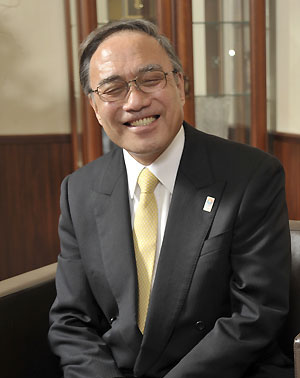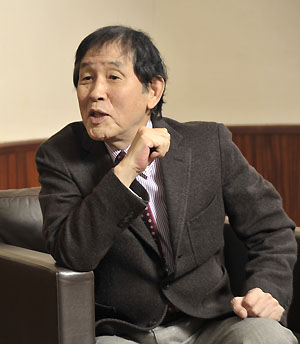For this issue we were fortunate to interview comedian Kin-ichi Hagimoto, popularly known as Kin-chan. Kin-chan formed the comic duo Konto 55-go with Mr. Jiro Sakagami and dominated comedy in the late 1960s. He went on to produce many extremely popular television programs.
Kin-chan is writing, directing, and acting in a comedy play set in a local shopping street. The play is scheduled to be the opening show at Hiratsuka Hall, located inside Square Ebara (Ebara Hiratsuka General Citizens’ Hall) and opening this April on the former site of Hiratsuka Elementary School.
Shinagawa City is developing administrative programs meant to make residents glad they settled down in Shinagawa and inspire them to stay here. During the conversation, we asked Kin-chan for some hints on how we can create a livelier and more cheerful city.
At Hiratsuka Hall, Opening
in April, the Opening Show
Will Be . . .
■Hagimoto: When I first heard about Hiratsuka Hall, I was really surprised. Nobody wants to build a new theater these days, or even thinks of trying. And because no one is willing to take on a challenge like this anymore, Japan has lost a lot of its dreams, hopes, and good cheer. Everyone is chasing after surefire success and ending up losing in the end.
■Mayor Hamano: Hiratsuka Hall is not so large that it can be called a theater, but I believe that we were able to build a nice hall with 360 seats. When it opens this April, I hope we can make a good start with your help, Kin-chan. I hear that the comedy you’re planning to perform is set in a local shopping street.
Nice Towns Have Lively Local Shopping Streets, and Nice Towns Foster Nice People
 ■Hagimoto: When I asked, “Is there a local shopping street near the hall?” some young Shinagawa City residents replied proudly, “It’s rare for Tokyo, but we have a really lively shopping street!” And I thought it was great to see local people who are proud of the shopping street in their neighborhood.
■Hagimoto: When I asked, “Is there a local shopping street near the hall?” some young Shinagawa City residents replied proudly, “It’s rare for Tokyo, but we have a really lively shopping street!” And I thought it was great to see local people who are proud of the shopping street in their neighborhood.
■Mayor Hamano: Oh, they’re talking about the Musashi Koyama Shopping Street, which was called the best local shopping street in the East when it was first completed. Musashi Koyama had the longest arcade in the Tokyo metropolitan area, and even when it rains people can shop there without getting wet.
■Hagimoto: In nice towns, the local shopping streets are really lively. If stores in a shopping street close their shutters, the neighborhood residents should feel sorry. Markets that are farther away may be cheaper, but when local people feel it’s more comfortable to buy things in a particular shopping street, it creates a happier, nicer town.
■Mayor Hamano: Come to think of it, local shopping streets on friendly terms with neighborhood associations are really lively. I think that having a performance at Hiratsuka Hall about a local shopping street will encourage the shop owners of the area, and remind city residents about the importance of the local shopping street.
■Hagimoto: Asakusa, where I started out as a comedian, had a really dynamic shopping street. The friendly mistresses of the shops used to encourage us entertainers. I believe it’s good to remember our roots and proudly say, “Thanks to this local shopping street, I am what I am today,” or “It’s thanks to this town.” And vice-versa would be nice, too: “Thanks to that guy, our shopping street, our town, has become really cheerful and lively.” Support shouldn’t be a one-way thing; it should be a two-way kind of thing. We need to remember that behind every success is someone's small but sincere support.
Starting Out Being Told I Had No Talent—
There Is Big Success and Good Luck in Being
No Good
 ■Hagimoto: Three months after I started in show business, a respected director told me, “You have no talent at all.” That’s the reason why I’m the most surprised that I’ve become famous.
■Hagimoto: Three months after I started in show business, a respected director told me, “You have no talent at all.” That’s the reason why I’m the most surprised that I’ve become famous.
■Mayor Hamano: Konto 55-go had a lot of impact!
■Hagimoto: Even my partner, Jiro Sakagami, once told me, “The reason I chose you was because everyone else had already formed their groups and you were the only one left!” (laughs) So there we were, two inept people struggling to make it. Even if we weren’t funny, we just kept on moving, and we hoped that the audience would accept us if we showed we were trying our best and perspiring because of it. Then we started flying all over the place!
■Mayor Hamano: Yes, sometimes you disappeared from the television screen! (laughs) Until then, people used to think that comedians stood in front of the microphone and said funny things; but Konto 55-go had a fresh new feeling, and everyone went crazy about it.
■Hagimoto: If I had quit because I was told that I had no talent, I wouldn’t be here today. These days everyone tries to avoid being told that they’re incapable, but there is big success and good luck in being incapable. And when something that we expected to be difficult goes in the opposite direction, we human beings are deeply moved. What do you think most people said when asked, “What moved you the most?” during last year’s London Olympics?
■Mayor Hamano: Hmmm . . . Shinagawa City is participating in the campaign to host the 2020 Olympics/Paralympics, but . . . I don’t know.
■Hagimoto: Table tennis was No. 1, even though Japan’s team couldn’t win any gold medals. In other words, what moves the people who watch the Olympics isn’t who wins the gold medals, it’s the way the athletes try so hard in the games that are thought to be the most difficult to win a medal.
■Mayor Hamano: We tend to think of things that seem impossible as being negative, but perhaps the more such things there are, the more possibilities there are, right?
Acting Too Tough Is Boring—
Sometimes You Gain Something When You Don't Hide Your Weakness
■Mayor Hamano: Do you have a secret method for coming up with new ideas for your work?
■Hagimoto: I don’t copy other people. When people see or find out about something good, they try to copy it somehow. But that makes it impossible to come up with something better. That’s why when I try to come up with a new idea. I take a look around me, become aware of what’s already there, and start with that.
■Mayor Hamano: In the Togoshi Ginza Shopping Street, they are making various croquettes. It’s really popular because there are a lot of unique items, such as croquettes with oden inside.
■Hagimoto: By being creative with things that already exist, something even more delicious is born. Some attempts may end in failure, but maybe humble charm can compensate for it, and customers will want to offer even greater support. You know, Mayor Hamano, the other day, a hundred people joined our theater group, and they are all really tough!
■Mayor Hamano: What do you mean by “tough”?
■Hagimoto: I asked them, “What would you do if you had no food to eat for three days?”Everyone was very practical, responding with such answers as foraging for food by themselves, working at a cafeteria to eat, or asking their parents for help.
■Mayor Hamano: Ahhh, I see. Most people are able to fend for themselves.
■Hagimoto: People today seem to take action without involving the people around them, even though they may be surrounded by a lot of different people. No one wants to offer help to such people, because it seems to make no difference. Life is more enjoyable when people become involved with people. Acting too tough is boring.
■Mayor Hamano: Well, I always thought being tough was a good thing, but . . . do you mean it’s better to just reveal the real you?
■Hagimoto: I mean try asking for help when you have a problem. Admit your weaknesses, and you will find people will go out of their way to support you, and you may make your dreams come true. In this day and age, people don’t seem to have any dreams or hopes, but I think that’s where we can try to find hints to make people cheerful and lively.
■Mayor Hamano: Well, it was really an honor and a pleasure to be able to talk with you today. I hope you will continue to watch over and support Shinagawa. Thank you very much!



 ■Hagimoto: When I asked, “Is there a local shopping street near the hall?” some young Shinagawa City residents replied proudly, “It’s rare for Tokyo, but we have a really lively shopping street!” And I thought it was great to see local people who are proud of the shopping street in their neighborhood.
■Hagimoto: When I asked, “Is there a local shopping street near the hall?” some young Shinagawa City residents replied proudly, “It’s rare for Tokyo, but we have a really lively shopping street!” And I thought it was great to see local people who are proud of the shopping street in their neighborhood.  ■Hagimoto: Three months after I started in show business, a respected director told me, “You have no talent at all.” That’s the reason why I’m the most surprised that I’ve become famous.
■Hagimoto: Three months after I started in show business, a respected director told me, “You have no talent at all.” That’s the reason why I’m the most surprised that I’ve become famous.